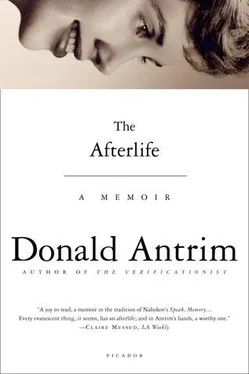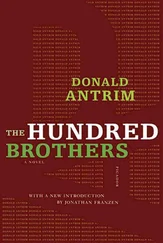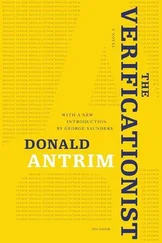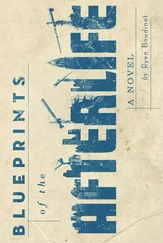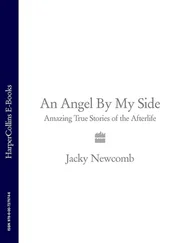“Spinach.”
“What else?”
“Rice.”
Or:
“String beans.”
Or:
“Fries.”
It worked out, he would explain — and my uncle was forced to explain this again and again, because people loved hearing it — that, over the course of a year, eating a menu that consisted of one entree per month (scallops in March; spaghetti in April; flounder in May), he got a balanced diet.
It is easy, looking back on all this now, to appreciate the despair and the terror inherent in my uncle’s preoccupations with self-sufficiency and preparedness, at home and in his car — particularly in the car, a four-door gas guzzler not unlike a rent-a-wreck version of the cars my mother’s father drove, a car different in every respect from the one that had, at a certain moment in my uncle’s youth, defined his enthusiasm for life. That car was a sexy, cherry-red Triumph TR3 with a walnut steering wheel and a rusted-out hole in the passenger-side floor — a casualty of salt air and the Florida weather — which forced the passenger to position himself extremely carefully, especially since the Triumph’s chassis rode quite low to the road. I was only seven or eight years old when Eldridge took me for drives in that car. As he accelerated and the RPM needle flickered on the dash, I would lean carefully forward and to the left, reaching, at my uncle’s invitation, to take hold of the wheel and guide the car along a straight path down the Sarasota streets.
But back to the story of Eldridge and his things. Each morning, he went to the carport and opened the trunk of the car. He stood before the items stowed there, moving and shifting his gear, replacing sweaty tennis clothes with clean ones, improving the overall packing dynamics, while, inside the house his white-haired mother, who often stayed up all night pacing, padded from bedroom to living room to porch to kitchen, worrying whether her son and grandson might eat a little breakfast before abandoning her for a day of horsing around and playing tennis and shooting pool with the friends from the Canada Dry loading dock out by the airport.
Once he’d established that everything was in order, that we had whatever we might need if, say, the world were to blow up and all life outside our car were to be catastrophically extinguished, we were off and running. Of what were our days together made? Looking back, I would say that our days were made of desire. We had structured activities, like tennis — I had not yet wrecked my shoulder with my high-toss, low-percentage, erratic yet explosive service, the theatrical serve of a flailing boy — and less formal pastimes, like wandering into convenience stores for supplies, crossing one of the crowded bridges leading to Siesta Key and the beach, driving north and dropping in at Joel’s house, stopping over afterward at Roger’s. There always came that point in tennis when the black clouds appeared from the gulf, and the rain came down, and everyone bolted off the courts and drank water. Then, just as suddenly, the sky would clear, and the world would become loud with the sounds of seagulls calling and smaller birds chattering. The sun would emerge, and we’d pick up mid-game, aiming to avoid puddles. After the game, we would walk out to the parking lot and my uncle would open the trunk of his car.
The trunk, as I see it now, was a physical repository, a form of warehouse or armory, in which my uncle secreted aspects of himself that would become, as the years went by, forbidden, denied, historical, forgotten. The things in the trunk were symbols of whatever in our lives — his and mine — might one day be taken away, totems representing sex and sport, music and work, eating and drinking, even talking and laughing. Together, my uncle and I stood in the parking lot with our hands in our pockets, staring at the pieces of the life we desired; and occasionally I would reach in and remove something, an article of clothing, for instance, or Eldridge’s disassembled fishing rod in its case. I might hold and admire the object, then put it back in its place, after which Eldridge would close the trunk and we would walk around to the sides of the car, open the doors, and get in. Our conversations were perfect. Whenever I said to him, in language sometimes having to do with home, sometimes with school, that I wanted to escape my situation, he nodded and suggested that we drive out to Siesta Key and have a swim at the beach before the sun went down.
The last day I ever spent with him, we played doubles with Roger and Joel. From the courts we could see Sarasota Bay and, lit violet against the red sunset, the shell-shaped roof of the Van Wezel Performing Arts Hall, known because of its paint job as the Purple Cow. After the game, my uncle and I walked to the car. As usual, we peered into, rummaged through, and slammed shut the trunk. Possibly I asked Eldridge about M. Had she been to visit? Was she coming? Did he love her? Did she love him? Would they ever get married? Why not? Then we drove to Joel’s house, in a development near Bradenton. Immediately after we’d walked in the front door, the telephone rang. Joel’s wife answered, put the phone down on a counter, and said, “Bob, it’s your mother. She’s been calling.”
It happened frequently. Within a few hours of our leaving the house, his mother began dialing numbers for bars, restaurants, people’s homes, wherever he might be found. She wanted to know when he planned to return to her. She wanted to know if he was drinking beer. She wanted to know if he would be out late. She wanted to know if he was telling her the truth. I could hear him speaking into the phone in Joel’s kitchen, answering her: “Yes, Don’s here. Yes, he’s having a good time. No, I’m not letting him drink any beer. Yes, he’s had something to eat. No, I’m not driving fast. No, we won’t be out late.” So it went. When we left Joel’s and drove with Roger and Joel and Joel’s wife in a caravan to shoot pool on the enormous pool table that happened to be pretty much the only item of furniture in Roger’s living room — in Roger’s entire house, as far as I could make out — the telephone rang and again I heard my uncle speaking to my grandmother:
“Yes, we’re playing pool. No, we’re not betting any money. Don’t worry, I won’t let him drink any beer. Yes, we’ll be home soon.”
It was around this time that I was learning, in imitation of my uncle’s adult friends, to call Eldridge Bob.
“Bob, what are we eating?” I asked him when, later that night, after tennis and billiards, after we’d driven out Fruitville Road to the house, parked in the carport, and checked the trunk one last time, we left the world of the car and entered the realm of Eldridge and his mother.
The stove lights were on in the kitchen. On the other side of the house my grandmother moved about. I could see her in the shadows. She was a pale shadow in her blue housedress in her dark bedroom, behind sliding glass doors that opened through curtains onto the porch, where I slept on a sofa bed.
“Pork chops.”
“What are we having with them?”
“Fries.”
“All right. Is it time for Johnny Carson?”
“Just about.”
“Should I turn on the TV?”
“Turn it on,” he said. He was cooking, using the broiler and a fork. I sat in his room, where the TV was, staring at his magazines. My uncle, I remember, always had in his room a certain game for one player, Labyrinth, basically a wooden box fitted with a pivoting top, on which was fashioned a kind of maze through which the player maneuvered a steel ball. My uncle could turn the knobs and guide the ball safely through. I drank a soda and played the game for a while, and my uncle opened another beer for himself.
Eldridge was a tall and beautiful-looking man. He tanned in the sun to a reddish shade characteristic among people of Scottish descent. His forehead had a scar from the time he’d walked straight into a forklift blade. His beer gut did not detract from his appeal. He wore a gold chain. He looked as if he’d be right at home at the Playboy Mansion pool parties pictured in the magazines beside the bed.
Читать дальше
